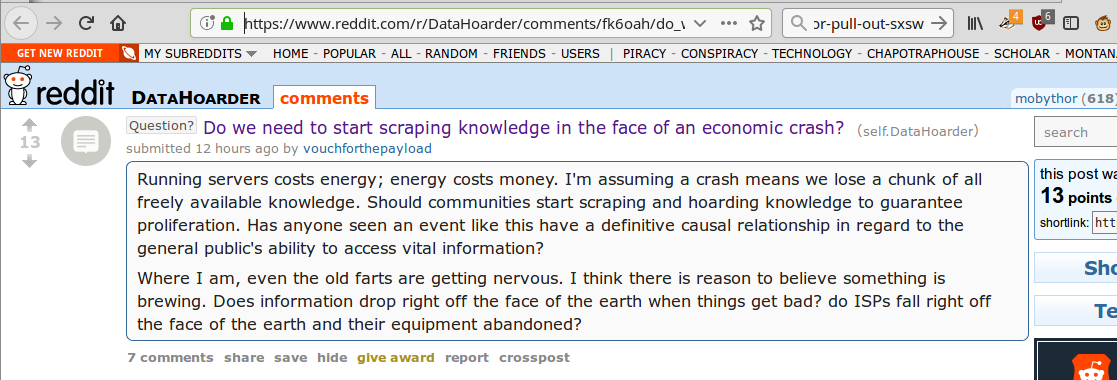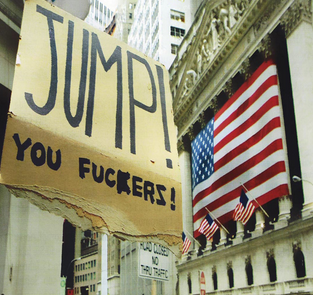Economic Crash of 2020: The Fuckening
Broad notes: Despite the predictably halfwit press coverage, this is really a completely separate phenomenon from the nCoV pandemic; some drivers are certainly coming from inside the nCoV dynamic, but most of them are pre-existing conditions. All of them are being aggravated by the dual supply/demand implosion that is cascading from Asia to the rest of the world. The situation is sprawling and complex, but everything is downstream from oil, USD and consumer demand.
Massive market corrections were long overdue, the global economy has been slowing down / stagnatingprior to the nCoV and oil shocks, and Barack Obama did not preside over anything resembling a "recovery." In many ways what is happening right now is a continuation of the 2007-09 "Global Financial Crisis" -- RI megathread is here, and full of valuable history.
The circumstances may be surprising/unexpected, but the crash itself is absolutely not. Much has been made, especially in QAnon circles, of the parade of high profile CEO resignations at the beginning of 2020, but it's worth noting that parade began in 2019, a record year that already had observers agitated.
The biggest x loudest headlines are coming from stock market crashes; which seem to happen every other day now. However, that's also probably the least significant aspect of the current crisis, since a majority of Americans own no stocks, and a majority of those who do only hold them through pension plans they have effectively zero control over. As we saw in the last big crash, pension plans / "institutional investors" were the dumb money that got burned first when the leveraged debt bubble popped. Little fish are essentially a moat around ruling class capital.
Speaking of little fish, we're comprehensively fucked. Many if not most of us will not have jobs a month from now. Large sectors of the US/EU economy are already effectively destroyed -- the retail / service sectors cannot work remotely so they're faced with layoffs and bankruptcy. Bars and restaurants are low-margin businesses and will not be able to weather weeks, let alone months, of no income.
More background: US Employment - Wikipedia
Transportation and shipping have both been hit early due to supply chain stoppages. Most airlines are facing Chapter 11 status by May, and ship crews & dockworkers are either standing idle or laid off.
Over the past two decades China has become a central driver of the global economy (and input source for global supply chains) and they took the brunt of the pandemic first. Analysts are still trying to get a handle on precisely how bad things are, and those numbers will shape everyone's models of what to expect for the rest of 2020. That's not necessarily a good thing, and may not provide much value in terms of accurate projections.
Basic rule of thumb: everyone around the world is taking double-digit hits to their GDP this year. Analysts won't admit to this yet because they're still talking their books.
Bear in mind, all of those numbers are from February, so they only reflect seven days of the impact from a lockdown that began January 23.
The biggest open question going forward is how governments will intervene on the consumer level. ("Citizens" are an outdated concept, after all.) I mentioned that most Americans own no stocks; more significantly, most Americans own no savings, either, living "paycheck to paycheck," as Senator Sanders keeps reminding us.
Absent something very much resembling a Universal Basic Income, most Americans are going to see their lives destroyed by what's to come. Tax holidays and even debt jubilees will also see much discussion in the weeks (and months (and years)) to come. It might even happen, too, with Mitt Romney saying shit like this:
“Every American adult should immediately receive $1,000 to help ensure families and workers can meet their short-term obligations and increase spending in the economy.”
Here's to optimism.
Massive market corrections were long overdue, the global economy has been slowing down / stagnatingprior to the nCoV and oil shocks, and Barack Obama did not preside over anything resembling a "recovery." In many ways what is happening right now is a continuation of the 2007-09 "Global Financial Crisis" -- RI megathread is here, and full of valuable history.
The circumstances may be surprising/unexpected, but the crash itself is absolutely not. Much has been made, especially in QAnon circles, of the parade of high profile CEO resignations at the beginning of 2020, but it's worth noting that parade began in 2019, a record year that already had observers agitated.
The biggest x loudest headlines are coming from stock market crashes; which seem to happen every other day now. However, that's also probably the least significant aspect of the current crisis, since a majority of Americans own no stocks, and a majority of those who do only hold them through pension plans they have effectively zero control over. As we saw in the last big crash, pension plans / "institutional investors" were the dumb money that got burned first when the leveraged debt bubble popped. Little fish are essentially a moat around ruling class capital.
Speaking of little fish, we're comprehensively fucked. Many if not most of us will not have jobs a month from now. Large sectors of the US/EU economy are already effectively destroyed -- the retail / service sectors cannot work remotely so they're faced with layoffs and bankruptcy. Bars and restaurants are low-margin businesses and will not be able to weather weeks, let alone months, of no income.
Via: FT
If housebuilders led America into its last recession, restaurants, casinos, hotels, cruise ship operators and airlines are leading the way this time. And after just four weeks in which US equity markets swung from hitting highs to pricing in the reversal Mr Singerman fears, the impact is starting to show in the real economy.
...the greater toll may be in industries that have nothing to do with global supply chains, economists believe. Ioana Marinescu, a labour economist at the University of Pennsylvania, predicted a collapse in what she called “human contact industries” such as restaurants, bars and theatres.
Those industries also tend to be dominated by smaller businesses with less cash on hand and less access to credit, she notes. Restaurants in particular have a high failure rate at the best of times. “We can expect those businesses to fail,” she said.
The food services industries alone employ 12m people in the US, up 30 per cent in the past decade.
More background: US Employment - Wikipedia
Transportation and shipping have both been hit early due to supply chain stoppages. Most airlines are facing Chapter 11 status by May, and ship crews & dockworkers are either standing idle or laid off.
Via: FT
“The world is shutting down,” said Patrick Berglund, chief executive of Xeneta, an Oslo-based provider of data on container shipping rates. “We are super worried about what is happening. What is different [from previous shocks to global trade] is that usually it’s just a corridor or two. Now it’s worldwide. Everyone is panicking.”
The Baltic Dry index — which tracks the cost of shipping bulk raw materials such as metallic ores, coal and grains and is therefore seen as a forward indicator of global economic activity — has fallen 80 per cent from a recent high last September.
Over the past two decades China has become a central driver of the global economy (and input source for global supply chains) and they took the brunt of the pandemic first. Analysts are still trying to get a handle on precisely how bad things are, and those numbers will shape everyone's models of what to expect for the rest of 2020. That's not necessarily a good thing, and may not provide much value in terms of accurate projections.
Basic rule of thumb: everyone around the world is taking double-digit hits to their GDP this year. Analysts won't admit to this yet because they're still talking their books.
Via: FT
China’s industrial output contracted at the fastest pace on record in the first two months of this year and urban unemployment hit its highest rate ever in February, as the coronavirus brought the world’s second-largest economy to a standstill.
Industrial output tumbled 13.5 per cent in the first two months of this year, the National Bureau of Statistics said on Monday. This would represent the largest contraction on record, according to Reuters data. The urban unemployment rate also surged to 6.2 per cent in February, the NBS said.
The latest economic data also showed that China retail sales plummeted 20.5 per cent year on year in January and February and fixed asset investment fell 24.5 per cent, down from 5.4 per cent growth when the data were last reported.
The numbers were well below analysts’ expectations with many China experts expressing surprise that government officials were willing to report such devastating figures.
Bear in mind, all of those numbers are from February, so they only reflect seven days of the impact from a lockdown that began January 23.
The biggest open question going forward is how governments will intervene on the consumer level. ("Citizens" are an outdated concept, after all.) I mentioned that most Americans own no stocks; more significantly, most Americans own no savings, either, living "paycheck to paycheck," as Senator Sanders keeps reminding us.
Absent something very much resembling a Universal Basic Income, most Americans are going to see their lives destroyed by what's to come. Tax holidays and even debt jubilees will also see much discussion in the weeks (and months (and years)) to come. It might even happen, too, with Mitt Romney saying shit like this:
“Every American adult should immediately receive $1,000 to help ensure families and workers can meet their short-term obligations and increase spending in the economy.”
Here's to optimism.
Via: CNN
JPMorgan Chase CEO Jamie Dimon made a joke Tuesday about the deadly coronavirus outbreak.
"I had this nightmare that somehow in Davos, all of us who went there got it, and then we all left and spread it," Dimon said Tuesday at the bank's annual investor meeting. "The only good news from that is that it might have just killed the elite."
Attendees laughed after he made the comment. Prior to his joke, Dimon noted that that he hopes the virus gets contained and "feels terrible" about it.


